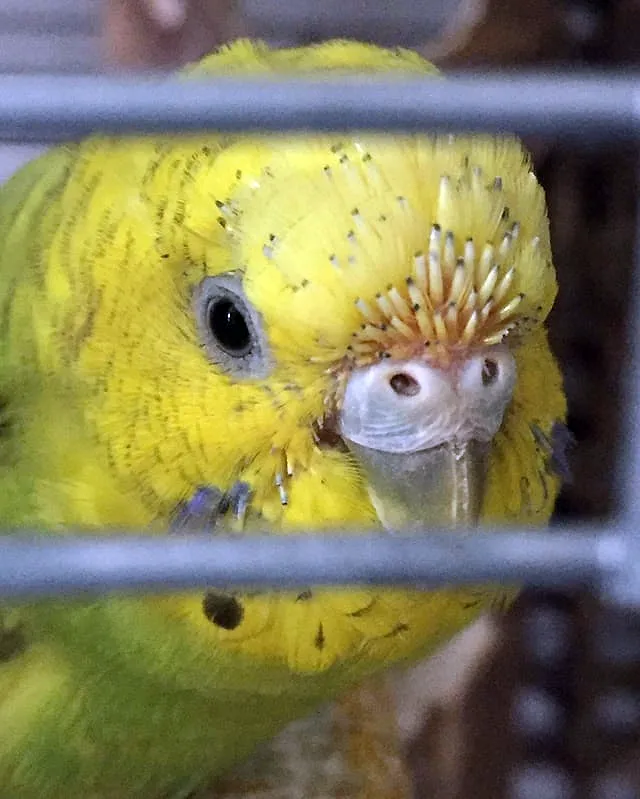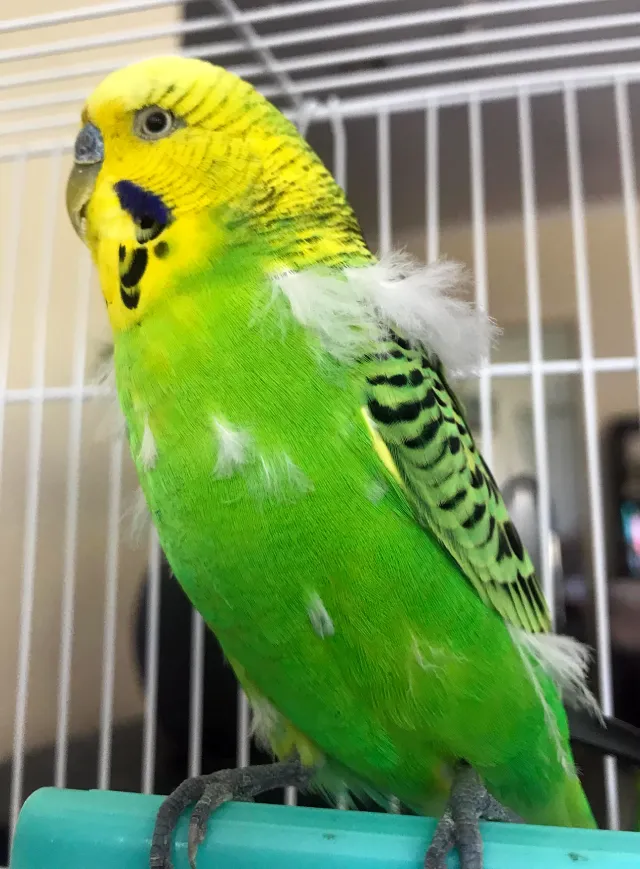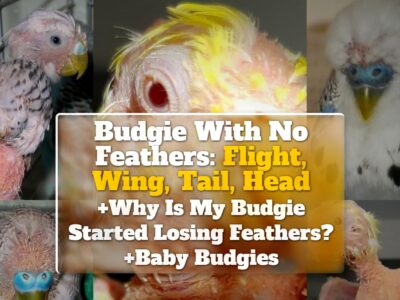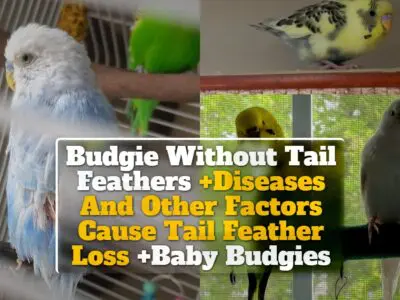Feather loss in budgies can be due to natural molting, stress, poor nutrition, parasites, hormonal imbalances, infections, allergies, or even self-plucking due to boredom or anxiety.
The exact cause can be identified by observing accompanying symptoms or with a vet’s help.
As an avid bird lover and former budgie owner, I’ve decided to address a common concern shared by many budgie caretakers: “Why are my budgies’ feathers falling out?”
In this guide, we will explore the top 10 reasons that could explain this phenomenon, drawing from my experiences, insights, and research.
1. Normal Molting in Budgies
Molting is a natural process in which birds, including budgies, shed their old feathers to make way for new ones.
This event is entirely normal and is something that happens periodically throughout a budgie’s life, just like the changing of leaves in different seasons.
It is not unusual to observe a significant number of feathers falling out during this process.
In fact, this is a sign that your bird’s body is functioning as it should.
To better comprehend this, let’s break down the molting process:
- Old feathers fall out: This is the part of the process that causes concern for many bird owners. The sight of feathers all over the cage might seem alarming, but rest assured, it is part of a healthy budgie’s life cycle.
- New feather growth: After the old feathers have fallen out, you should start to see new ones growing in their place. These feathers may initially look thin and delicate, but they will become firmer and more robust over time.
- Full feather development: Eventually, these new feathers will fully form, looking shiny and vibrant. This indicates the successful completion of the molting process.
It’s important to understand the signs of molting to help differentiate between healthy feather shedding and potential health issues.


2. Illness and Infections
Various illnesses and infections, such as bacterial or viral infections, can cause a budgie’s feathers to fall out.
These illnesses often come with other symptoms such as changes in appetite, behavior, or droppings.
Here are some common signs of illness that you should keep an eye out for:
- Change in appetite: If your budgie is eating less than usual or has suddenly become a fussy eater, it could be a sign of sickness.
- Altered behavior: Is your budgie less active than usual? Does it seem more lethargic or less interactive? These could be signs of an underlying illness.
- Changes in droppings: Keep a close eye on your budgie’s droppings. Changes in color, consistency, or frequency can be an early indication of health issues.
3. Overgrooming and Plucking
Sometimes budgies may overgroom themselves or engage in feather plucking, often due to boredom or stress.
Even overgrooming by another budgie can also result in feather loss. Here’s what you need to know:
- Overgrooming: Budgies are meticulous groomers, but excessive grooming can lead to feather loss. If you notice your budgie grooming itself more often than usual, this could be a sign of stress or boredom.
- Feather plucking: This is often a sign of boredom, stress, or discomfort. If your budgie is plucking its own feathers, try introducing new toys or making changes in its environment.
Understanding your budgie’s behavior and providing a stimulating environment can help prevent this issue.
A happy budgie is a healthy budgie, and taking time to interact with your budgie can significantly reduce the chances of overgrooming and plucking.
4. Nutritional Deficiencies
Just like humans, birds also require a balanced diet for optimal health.
Nutritional deficiencies can result in unhealthy feathers that easily fall out. This can often be addressed by modifying your budgie’s diet or adding suitable supplements.
Let’s break down the key nutrients needed for healthy feather growth:
- Protein: Feathers are mostly made of keratin, a type of protein. Hence, a protein-rich diet is essential for your budgie during the molting process and for maintaining feather health in general.
- Vitamins and minerals: Vitamins such as A, B, D, E, and K, along with minerals like calcium, are vital for the growth of healthy feathers.
- Essential fatty acids: These are necessary for the development of healthy skin and feathers. Foods like seeds and nuts can provide these essential nutrients.
Should you observe unhealthy feathers or excessive feather loss, consider adjusting the budgie’s diet to include more of these nutrients.
5. Environmental Stressors
Stressful situations such as changes in the environment, noise pollution, or rough handling can cause a budgie to lose feathers.
Hence, managing these stressors and providing a calm and stable environment is crucial for feather health.
Here are some strategies:
- Maintain a consistent environment: Sudden changes in temperature, lighting, or cage placement can be stressful for your budgie.
- Minimize noise pollution: Constant exposure to loud sounds can cause stress, leading to feather loss.
- Handle with care: Rough handling can not only physically damage feathers but also lead to stress-induced feather loss.
Striving to maintain a stable, calm environment for your budgie can significantly help in preserving its feather health.
6. Parasites
Parasites, such as mites, can cause irritation and feather loss in budgies.
These parasites can be an unwelcome guest, feeding on your bird’s blood and causing immense discomfort.
Here are some common signs of a parasite infestation:
- Constant scratching or preening: This could be a sign of irritation caused by parasites.
- Visible pests on the body or in the cage: You might spot tiny creatures moving on your budgie’s body or in the cage.
- Unexplained feather loss: If your budgie is losing feathers without any of the previously discussed causes, parasites could be the culprit.
The good news is these parasites can be treated with appropriate medications as advised by a vet.
Ensuring regular veterinary check-ups can help in early detection and treatment of such conditions, thereby keeping your budgie happy and healthy.
7. Hormonal Imbalance
Just like in humans, hormonal imbalances in budgies can lead to various health issues, including feather loss.
These imbalances may be due to natural cycles or external factors such as stress, diet, or illness.
It’s important to be vigilant about the following signs:
- Unusual behavior: Hormonal budgies can become more aggressive, territorial, or vocal.
- Changes in physical health: Watch for changes in appetite, weight, or energy levels.
- Changes in feathers: Rapid, excessive feather loss or abnormal feather growth can be signs of hormonal imbalance.
Consultation with a vet can help diagnose and treat these imbalances. A blood test may be necessary to accurately gauge hormone levels in your budgie.
8. Allergic Reactions
Budgies can have allergic reactions to certain substances or foods that result in feather loss.
Allergens can be present in food, environment, or even materials used in their cage.
Keep an eye out for these signs:
- Constant scratching or preening.
- Redness or inflammation on the skin.
- Changes in stool or appetite.
Identification and removal of the allergen can help stop the feather loss.
Consulting with a vet can help pinpoint the exact allergen and propose an appropriate solution.
9. Effects of Medication
Certain medications can cause side effects, including feather loss in budgies. These side effects can vary from mild to severe, depending on the medication and dosage.
If feather loss coincides with new medication, take note of:
- The timing of feather loss: Did it start shortly after beginning the medication?
- The condition of the feathers: Are they falling out, being pulled out, or showing signs of damage?
- Any other side effects: Are there changes in behavior, appetite, or overall health?
Consult with your vet about potential alternatives or solutions if you observe these signs.
They may adjust the dosage or suggest a different medication that won’t cause feather loss.
10. Budgie Losing Feathers in Specific Areas
Feather loss in specific areas such as around the eyes, tail, head, chest, or under the wings can point to specific issues or conditions.
Each of these instances has its potential causes and solutions that need to be addressed individually.
Here are some possibilities:
- Head and Neck: Feather loss here could be due to self-plucking, indicating stress or a skin condition.
- Chest and Belly: Feather loss in this area could be due to a condition called “broody patch,” which usually happens when a female budgie is ready to lay eggs.
- Under the Wings: It might be due to parasites or a fungal infection.
- Tail: Damage or loss here could indicate a rough cage environment or trauma.
Treatment of Budgie Feather Loss
When dealing with budgie feather loss, it’s critical to identify and address the root cause.
Treatment options can vary widely depending on the underlying issue. Here’s an overview of possible treatments for different causes of feather loss:
- Environmental Changes: If stress or poor living conditions are causing the feather loss, it may be resolved by improving the budgie’s environment. This could involve reducing noise levels, ensuring a consistent light-dark cycle, or improving cage cleanliness.
- Dietary Adjustments: For feather loss linked to nutritional deficiencies, a change in diet may be necessary. This could involve introducing foods high in necessary nutrients or using supplements.
- Medication or Surgery: In cases of parasitic infestations, infections, or hormonal imbalances, a vet might prescribe medications or even perform surgery.
- Avoidance of Allergens: If the feather loss is due to an allergic reaction, the solution will involve identifying and removing the allergen from the budgie’s environment.
How to Differentiate between Molting and Plucking
Understanding the difference between molting and plucking is essential to address feather loss properly.
- Molting is a natural process where budgies shed old feathers to make way for new ones. It occurs periodically, typically once or twice a year. Key signs of molting include evenly distributed feather loss and the presence of new feather growth.
- Plucking, on the other hand, involves a budgie pulling out its own feathers, often due to stress or health issues. Signs of plucking can include feather loss concentrated in areas the budgie can reach with its beak, such as the chest and under the wings, and no new feather growth in these areas.
📺 Video
FAQs
How Fast Do Budgies’ Feathers Grow?
The growth rate of budgie feathers can vary, but on average, it takes about 4-6 weeks for a feather to fully regrow after it has been lost or plucked.
This timeline can be affected by the budgie’s diet, overall health, and the specific type of feather (flight feathers typically take longer to grow than down feathers).
Why Don’t the Budgie’s Feathers Growing Back?
If your budgie’s feathers aren’t growing back, it could be due to several reasons:
- The feather follicles might be damaged, often due to repeated plucking.
- Your budgie could be suffering from a nutritional deficiency that affects feather growth.
- Certain diseases can also impede feather regrowth.
Why Is My Budgie Eating His Feathers?
Budgies occasionally eat their feathers during molting, which is thought to help them reclaim some of the nutrients used in feather production.
However, excessive feather-eating could indicate a dietary deficiency or a behavioral issue.
What Are Some Visible Signs That May Accompany Feather Loss in Budgies?
Changes in behavior such as restlessness, constant preening, or loss of appetite, skin abnormalities like redness, swelling, or the presence of mites, and unusual feather appearance such as discolored, damaged, or sparse feathers can accompany feather loss in budgies.
Can Environmental Factors Cause Feather Loss in Budgies?
Yes, environmental stressors like sudden temperature fluctuations, noise, or changes in habitat can lead to feather loss in budgies.
These birds thrive in calm, stable environments, so changes in their surroundings can cause them to pluck their own feathers out of stress.
How Often Do Budgies Naturally Molt, and Could This Be Confused with Feather Loss?
Budgies naturally molt, or shed their feathers, once or twice a year, often changing their plumage after breeding season.
However, molting is a normal process that shouldn’t cause bald spots or visible discomfort.
If feather loss is excessive or the bird seems distressed, it might be a sign of an underlying issue.
Can a Budgie’s Diet Impact Its Feathers?
Absolutely. Nutrition plays a vital role in feather health. A diet lacking essential nutrients like proteins, vitamins, and minerals can lead to poor feather growth and cause them to fall out.
Providing a balanced diet rich in fruits, vegetables, grains, and appropriate bird feed is essential for maintaining feather health.
Is There Any Preventive Care for Feather Loss in Budgies?
Preventive care involves providing a nutritious diet, ensuring a stress-free environment, regular parasite checks, and keeping a close watch on the bird’s behavior and feather condition.
Regular vet check-ups can also help identify and treat potential issues before they lead to feather loss.


